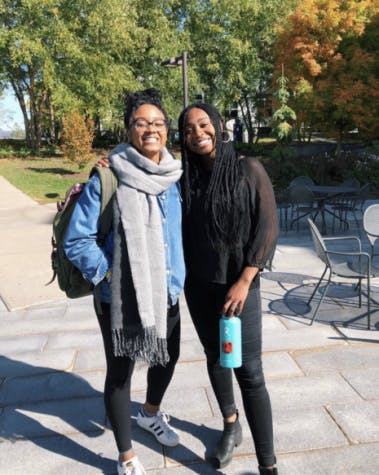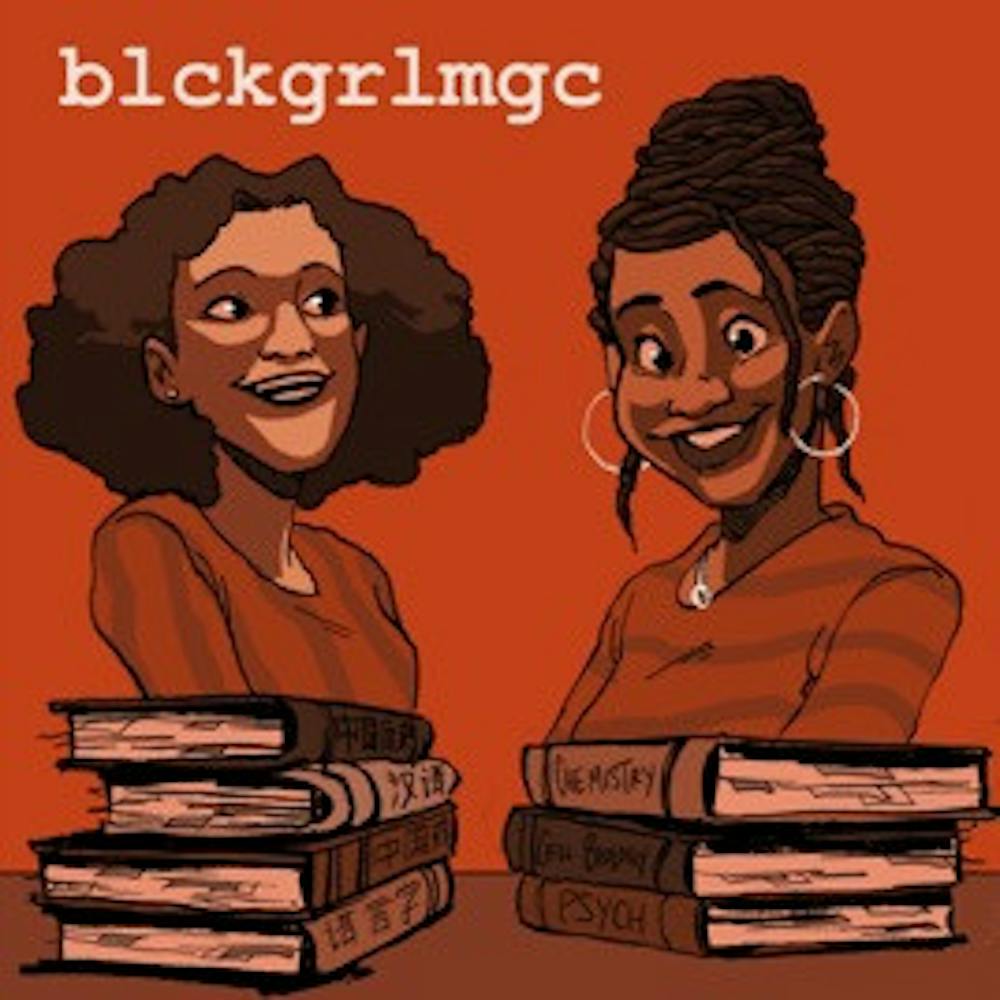“Hey guys, my name is Destini.”
“And my name is Megan.”
“And we are two black girls, at a predominantly white institution; trying to survive, at a predominantly white institution; and here’s the latest tea, at a predominantly white institution.”
This is how each and every episode of BLCKGRLMGC, a podcast started by Destini Armstrong ’21 and Megan Job ’21, begins. The podcast has a light-hearted tone, often filled with laughter and relatable commentary from Job and Armstrong. Alienation, inclusivity and sense of belonging — issues common to women of color at a predominately white institution (PWI) like Middlebury — are among the important themes of the podcast.
The two hosts started the podcast two years ago, during the spring of their first year on campus. Both hail from New York City, making the transition to rural, predominantly white Middlebury a uniquely challenging experience.
The podcast originated from an idea that Job’s friend had, and eventually the two decided to use podcasts as a platform to tell their stories at the college. Job believed that the value of the podcast lies in using storytelling to show the potential challenges that students of color face at a PWI. “What does it come down to? I want to talk about those tiny things that people don’t mention, such as how intimidating a group project may be and how it makes you feel so small.” Armstrong shared a similar sentiment in an interview. “I think it’s nice to know that we can put something out there that can help other people because we have heard that a lot of people are relating, that is all we want to do.” Job was glad that people find their podcast helpful. “Giving comfort to other women of color in similar situations is such a good feeling,” she said.

Armstrong and Job began the podcast when they were first-years.
Armstrong and Job pick their topic through a variety of means. Sometimes topics arise from the hosts’ personal experiences. “Megan might come back and be like, ‘oh my god this made me so frustrated [and] I can’t accept it’,” Armstrong said. Other times they hope to use the platform to address underclassmen specifically because they may need more advice and help to feel more at ease on campus.
The majority of the podcast’s audience is Middlebury students, including people who are abroad. Other listeners include Armstrong and Job’s friends from home. Armstrong initially presumed that there are more people of color listening because the themes seemed more immediately relevant. She added, however, that “a lot of white students come up to us and they’re like ‘we listened to your podcast, it’s such an eye-opener.’” Associate Professor of Writing and Rhetoric Hector Vila sometimes suggests topics, and many others also pitch topics to Armstrong and Job directly.
They are open to anything as long as the topic is related to the general theme of their podcast. Some of the interesting topics the podcast has covered include interracial dating culture on campus (“Episode 5 — White is Right?”), how professors teaching to the majority of classroom leaves students from underprivileged high schools at disadvantages (“Episode 25 — Mind The Gap”) and struggles with natural hair (“Episode 12 — Hair’s the Latest Scoop”).
Their hard work has garnered much recognition. After two years, they have produced 38 episodes, and on Apple Podcast, 71 ratings give them 5/5. Further, in April 2019, Armstrong and Job were awarded The Angels Award, which honors a sophomore woman of color who demonstrates leadership, scholarship and activism. To both, it was a recognition of their excellent podcast project. “It was exciting and humbling to know that people actually listen. We went in not knowing who is going to listen but people can actually relate which we found awesome,” Armstrong said.
The production process of the podcast has changed very little over the course of the past two years. When they first started, Armstrong and Job recorded every episode with GarageBand in either person’s room and took turns editing the recording. Armstrong is currently in a class about podcasting and is learning about new methods and techniques that could improve the quality of the podcast. “But it’s always been just talking into a laptop or mic and see what comes out of that,” she said.
[pullquote speaker="Destini Armstrong" photo="" align="center" background="on" border="all" shadow="on"]When you first come to college you have this idea of what college is. You are very much hopeful that you’re going to be part of that imagination. And then it became clear that we weren’t. It was very hard to transition out of that mentality.[/pullquote]
The breadth and depth of the podcast has developed. Topics grew to cover more diverse narratives by including the voices of individuals of different races and genders, and the tone, though still passionate, comes with more sangfroid, and demonstrates their composure under circumstances and topics that can often be emotionally trying. “When you first come to college you have this idea of what college is. You are very much hopeful that you’re going to be part of that imagination. And then it became clear that we weren’t. It was very hard to transition out of that mentality,” Armstrong said when asked about the reason behind this shift in tone.
Indeed, underneath the surface of jokes and anecdotes in the first few episodes there was embedded frustration. “When we first made it in spring of freshman year, we hated it here,” Armstrong continued, “But as semesters go on, you begin to adapt to the environment and you become more accepting. As I got older, I’m handling a lot better. Acceptance gets stronger.”
As the podcast went on, the hosts took a step back to look at the bigger picture, and invited their friends to speak about their experiences. While the show is still centered on the experiences of women of color, it expanded its discussion of the themes encountered in these experiences by including a wider variety of perspectives. Specifically, they invited their white friend who transferred from Dartmouth to Columbia because of the unbearable frat culture at the former to tell her story, which raised the important question of the true meaning of fitting in (“Episode 30 — It’s Not Just Us”). “Once you realize that this is just a foundation you have and you can do so much more [beyond college], you start to really develop,” Armstrong said.
This year, as Job is studying abroad in Brazil, the traditional dynamic of the production is challenged for the first time. When asked about the future of the podcast, Armstrong and Job seemed unsure. “I think it’s definitely one step at a time,” Armstrong said, “like Meg being abroad was definitely a transition, and I will be studying abroad in China in the spring, so we don’t really know the bigger picture yet.” However, they are open to leaving the podcast to the college as a platform for people to utilize and develop upon.
“I definitely have anxiety so I can’t look at the future like that,” Job said. “But I feel like Destini and I are becoming older and we are getting more and more preoccupied with our careers. I definitely would love to keep it going, because it’s a journey that is very important.”

Rain Ji '23 is a managing editor of The Campus. She previously served as an Arts & Culture editor.
She is majoring in International and Global Studies with a concentration in the Middle East and North Africa. Previously, she studied abroad in Amman at the University of Jordan. Outside of academics, she enjoys watching Criminal Minds and skiing.




